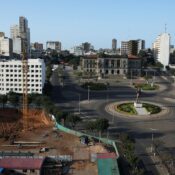
Nigerian labor groups interrupt airlines and shut down the power system over minimum wage
The main labor unions in Nigeria started an indefinite strike on Monday in protest of the government’s refusal to agree on a new minimum wage, which resulted in the shutdown of the national grid and disruption of flights throughout the nation.
Since President Bola Tinubu assumed office last year, the Nigerian Labour Congress (NLC) and the Trade Union Congress (TUC), two of the largest union federations in the nation, have gone on four strikes.
Union members, according to the Transmission Company of Nigeria (TCN), forced operators out of the nation’s electricity control rooms and shut down at least six substations before the national system was shut down at 02:19 am (0119 GMT).
Due to the strike, Ibom Air, a Nigerian airline, announced that it would be suspending flights till further notice. United Nigeria, on the other hand, reported that airports nationwide had been closed and that its flights had not been allowed to fly.
The aviation and electricity unions issued a statement on Monday stating that they have instructed members to stop providing services in accordance with the indefinite strike.
The oil unions also issued threats to stop oil production, but Gbenga Komolafe, the head of Nigeria’s oil regulator, stated that backup plans were in place to guarantee that the strike would not affect output.
Since assuming power, Tinubu has implemented the most radical reforms in Nigerian history, which has exacerbated the country’s cost-of-living crisis and driven inflation to an almost 30-year high.
Unions have put pressure on him to provide assistance to people and small companies following the removal of gasoline subsidies, which kept fuel affordable but came at a $10 billion annual cost to the government.
Following the breakdown of negotiations for a new minimum wage intended to mitigate the effects of reforms, unions announced an indefinite strike on Friday. They declared that the walkout will continue until a new minimum wage was established.
The TCN stated that although it was working to restore and stabilize the country’s grid, labor unions were impeding the process.
As the government attempts to wean the economy off subsidies, unions have also urged the reversal of an electricity pricing hike implemented last month for the wealthiest consumers who use the most power.
Nigeria’s privatization agency announced on Thursday that the nation had obtained a $500 million World Bank loan for its electrical industry.
All Categories
Recent Posts
Tags
+13162306000
zoneyetu@yahoo.com


